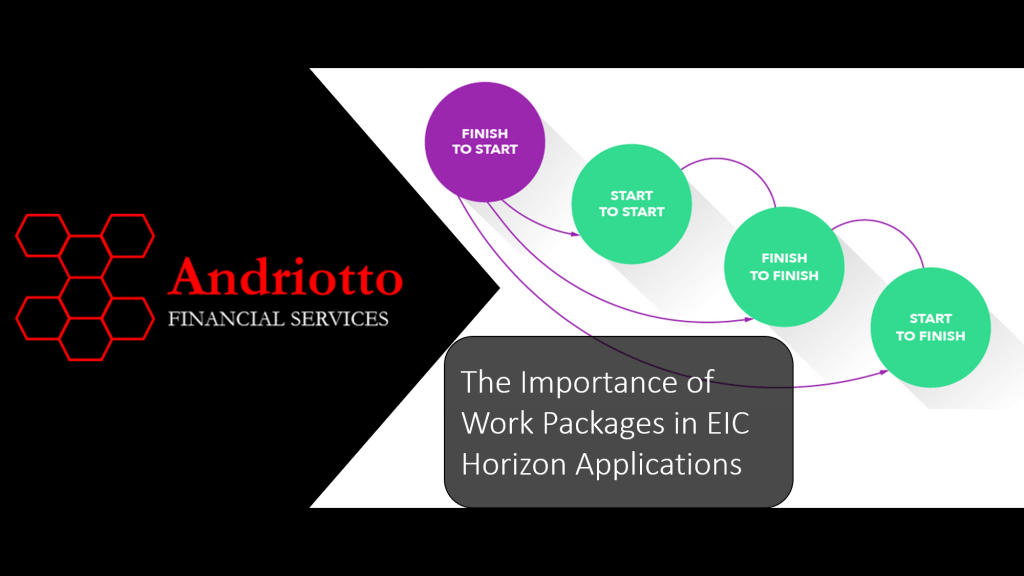When it comes to EIC Horizon project, the concept of work packages is central. Work packages provide important information when preparing the Horizon Project Proposal and budget and project evaluators assess them as a key area.
What is Work Package?
A work package is the smallest unit of a Work Breakdown Structure. When preparing a Work Breakdown Structure using the decomposition technique, project managers generally break down deliverables into smaller, more manageable chunks of work. Therefore, the packages should correspond to the Gantt plan of the undertaking.
This process of deconstruction continues until project managers consider the deliverables small enough work packages.
Each of these packages should be small enough to help the innovation Project managers estimate the duration and the cost. Project managers can schedule, cost estimate, monitor, as well as control work packages.
Why Are Work Packages Important?
By breaking a project down into work packages, the development of Work Breakdown Structures becomes easier—and project managers will have a finer level of control over assignments. It is easier to hold the project consistent to objectives set and targeted impact.
Other benefits include:
- Packages help understand whether a certain set of tasks or assignments leads to a stand-alone milestone achievement.
- Help plan for the identification of risks and their mitigation.
- Work packages allow for multiple teams and subcontractors to do simultaneous work in parallel on different components of an Innovation project. Each team follows the tasks defined for the work package and completes them by the specified deadline.
- Once the teams have finished their individual work packages, the entire project comes together with seamless integration. A specific person: a manager, supervisor, a team lead, or a designated team member most often oversees completion of a work package.
- Even though project managers estimate costs at an activity level, they aggregate these cost estimates to the work package level, where project managers measure, manage, and control them.
- For each work package, we can determine the direct labour costs. We can also determine the direct costs for material, equipment, travel, and contractual services. We can determine the direct costs for other non-personal resources for each work package. We can determine the indirect costs associated with each of these work packages.
Project managers then aggregate the individual costs of all the work packages to arrive at the authorized cost baseline or the authorized budget for the project.
How to Prepare a Work Package?
When breaking a Work Breakdown Structures down to the level of work packages, project managers could decompose the WBS nodes to extremely granular levels. This wastes time and actually makes the project difficult to understand, manage, and change. Project managers consider many things when deciding how far to decompose the WBS or how to create a work package. But a few important factors to consider are:
- Project managers should make work packages small enough to estimate for time and cost.
- The project manager and the project team should satisfy that the current level of detail at the work package level provides enough information to proceed with subsequent activities.
- Project managers should assign work packages small enough for a single person or group to be held accountable for results.
- Work packages can lie at different levels in the WBS hierarchy. Project managers should not artificially force their WBS into a structure. Where all the work packages lie at the same level in the WBS hierarchy. This results in problems as the project progresses. Like forced detail where you could have monitored and controlled specific parts of the work at a higher level. Or not enough scrutiny where you really need it when the project progresses.
Measuring Work Package Performance with Earned Value Management
Once an innovation project approves and execution starts, project managers can measure the performance of a work package. This measurement is by the earned value management technique. It is a commonly used performance measurement metric. This metric is commonly used. It integrates project scope, cost, and schedule measures to help assess and measure project performance. The technique calls for preparation. It requires preparation of an integrated baseline against which project managers can measure the performance of the work packages. This measurement is for the duration of the project.
Earned Value Measurement develops and monitors three key dimensions for each work package:
- Planned Value: The authorized budget allocates planned value to the work package for the work to be accomplished.
- Earned Value: The approved budget for the work package assigns earned value as the value of work performed.
- Actual Cost: The total cost actually incurred and recorded accomplishes work performed for a work package as the actual cost.
Variances from the approved baseline are also monitored.
Our Value Added
At Andriotto Financial Services we have a complete set of tools for checking the relevancy and self-sufficiency of work packages.
We also map WP towards the objectives and assignments laid out in the project plan. This is to make sure the whole picture is consistent. Altogether there should be a complete agreement between innovation project objectives and work packages. Someone should address the issue if set goals are not covered by a WP.
We stand ready to provide guidance and even audit packages so that they become relevant, accurate and adequate to the overall vision of the Innovation start-up.
At AFS, we are passionate about fostering innovation and empowering ambitious minds to flourish. Our mission is to provide best-in-class financial services for traditional and crypto deals, exploit European grants, and use quantitative methods to improve clients’ performance. We aim to help our customers unlock their full business potential.
Are you looking to fund your next venture or unlock grant opportunities?
Contact us at [email protected]!



